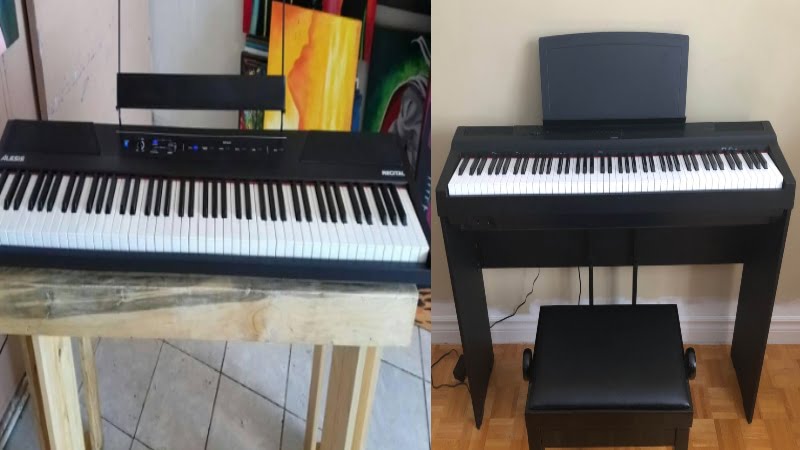After reviewing the incredibly affordable Alesis Recital Vs Yamaha P125 which costs four times more, it’s clear Yamaha’s contender is overall the better piece.
Digital pianos come in different shapes and sizes, and more importantly, price points. The featured pianos in this report – Alesis Recital Vs Yamaha P125 – are two pieces that represent the huge disparity in cost. A huge favorite among beginners on a budget, the former only costs a little over $200. The latter, on the other hand, has a price tag of nearly $1000.
Yamaha, known for manufacturing exquisite acoustic grands for over a century, have wowed many professional musicians with their digital pianos. Their P125, an upgrade from the discontinued P115, is a very good example of this. The biggest trouble with it is its hefty cost.
Alesis, a newcomer in the industry, is transforming conventional ideas that piano playing is only for the elite by offering high quality pieces at surprisingly low prices. It’s no wonder why thousands choose this over big names like Yamaha, evidenced by its humongous sales on online shopping sites like Amazon.
But which really is the better digital piano between the two? And, more importantly, which should you own?
Alesis Recital Vs Yamaha P125: Comparison Chart
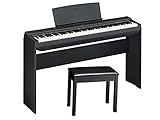



Last update on 2025-04-12 / Affiliate links / Images from Amazon Product Advertising API
Alesis Recital Vs Yamaha P125: Head to Head Comparison
For most people, one of the most important considerations in shopping for practically anything is the price. The affordability of the Recital by Alesis is, hands down, its most attractive feature. But it also does not completely disappoint in many functions. The Yamaha P125 is a beautiful piece; but many take a pass at buying it because of its price tag.
To make a fair assessment, I’ve decided to set aside the cost for a while and instead look under the hood and compare and contrast the technical details of these two digital pianos. And from what I have seen, the Yamaha P125 holds up better than the Alesis Recital 3:1.
Feel and Playability
The Winner: Yamaha P125
Top of the line acoustic uprights and grands have a very specific feel when the keys are tinkled with. Aside from the actual texture of the ivories and ebonies, the feel of the keys pulling on the hammer to strike the string is also quite distinct. This is what manufacturers try to duplicate when they make digital pianos. Some succeed, some fall short of expectations, and others don’t even try.
Alesis did not make the attempt to fully recreate acoustic pianos with their Recital. Yamaha worked extra hard to do this with their P125.
+Hammer Action
The Alesis Recital has semi-weighted keys, an obvious attempt to simulate the authenticity of acoustic keys with the budget still in mind. This is a huge no-no for many professional musicians but beginners won’t mind.
On the other hand, Yamaha impresses with their GHS or Graded Hammer System because it does mimic the pull on the hammer of the real thing. On top of that, they added the transitioning heaviness from the bass to lightness of the trebles.
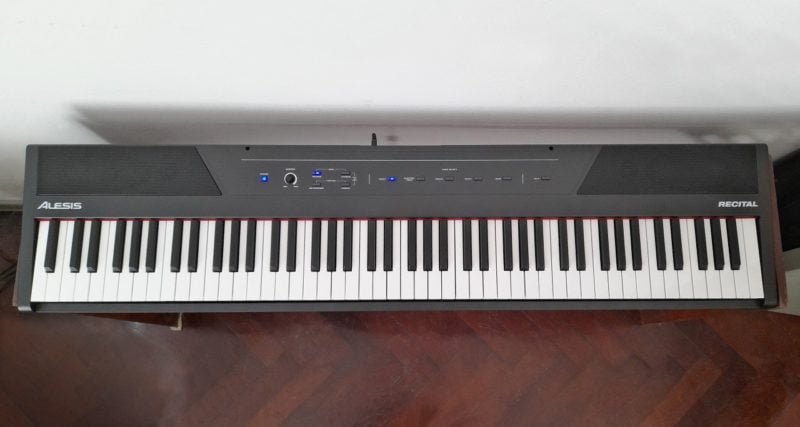
+Touch Sensitivity
This function adds to the realism of the playing experience because, in acoustic grands, the pressure you put on the keys also affects the intensity of the sound produced. Both the Recital and the P125 have touch sensitivity options that can be adjusted to the user’s liking.
+Key Texture
The Alesis Recital’s keys are made from non-coated plastic, expected of the $200 price tag, to be honest.
This is where Yamaha let a lot of people down. As a supposed P115 upgrade, many were hoping that the keys would get the improvements needed to add to the realistic experience. That, extremely unfortunately, didn’t happen.
Tone
The Winner: Yamaha P125
If there is one thing that Yamaha is really great at, it’s designing instruments that create clear and vibrant sounds. And it’s hard for any newcomer, Alesis included, to match the experience that Yamaha has under their belt.
+Tone Generator
Yamaha’s excellent acoustic grands are the backbone of their digital pianos’ sound engine. The P125 makes use of the Pure CF sound engine, a huge improvement from the P115’s 1980’s AWM or Advanced Wave Memory technology.
To be fair, Pure CF and AWM are basically sampling – recording several demos of an instrument and then combining all these together into an encyclopedia of sounds. Sampling is what Alesis uses for the tone generation of their Recital. But what really sets the P125 apart is the use of the Yamaha CF grand – one of the most admired pieces all over the world – reproducing its brilliant clarity, vibrance, and depth in a smaller and portable instrument.
+Sound Library
Alesis Recital has a good enough number of voices: acoustic piano, electric piano, organ, synth, and bass. To be honest, beginners who need to practice the basics just need the first one. However, this collection is too limited for experimentation.
Yamaha P125 has a whopping 24 voices – different kinds of grand pianos, electric pianos, organs, vibraphones, strings, and bass. The varied options allow professional musicians – especially those who go on gigs – to perform different kinds of music and work on their compositions.
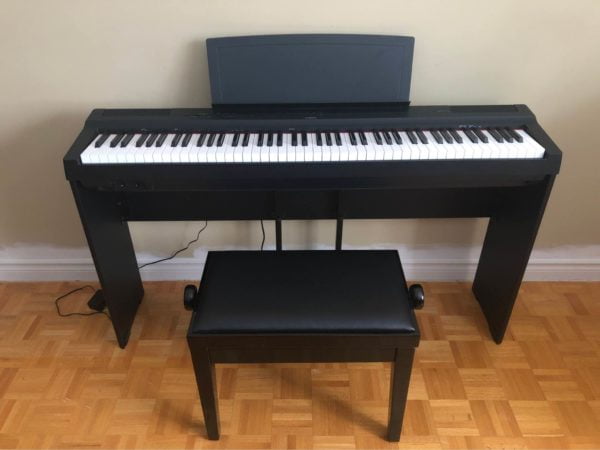
+Demo Tracks
Piano Functions and Features
This is something most people consider as useless, thinking these pre-recorded tracks are something to just listen to. But with the right functions, these can actually be helpful for newbies who want to learn playing certain pieces even without a tutor.
Compared to the very limited number in the Alesis Recital, Yamaha P125 has dozens from renowned composers like Brahms and Bach. On top of that, the tempo can be adjusted so users can really follow the notes carefully.
The Winner: Yamaha P125
For its amazing affordability, the Alesis Recital actually delivers in this chapter. To be perfectly succinct, I personally have no complaints about it. Despite that, Yamaha still tops the efforts of Alesis as it has packed several more features and functions in the P125.
+Polyphony
For a $200 digital piano, it’s awesome that the Recital has 128 max polyphony. The $500 P115 of Yamaha has less than a hundred, truly a disappointment for many. This is one of the improvements the company made on the P125, as it has 198.
+Effects
Alesis has given the Recital two basic digital effects: Reverb and Chorus. That’s enough for most musicians, myself included.
Yamaha bumped this particular feature up another notch for the P125. Aside from the four different Reverbs, the company added Damper Resonance, IAC or Intelligent Acoustic Control, and Sound Boost.
+Recording Capability
Yamaha’s P125 has a built-in recorder. This is a great feature since beginners can listen to their practice runs and composers can immediately hit record when a tune or a progression comes to mind.
The Alesis Recital does not have this capability. But like most entry-level digital pianos, it is still possible to capture tracks by connecting an external device (a computer or a phone) via the USB input.
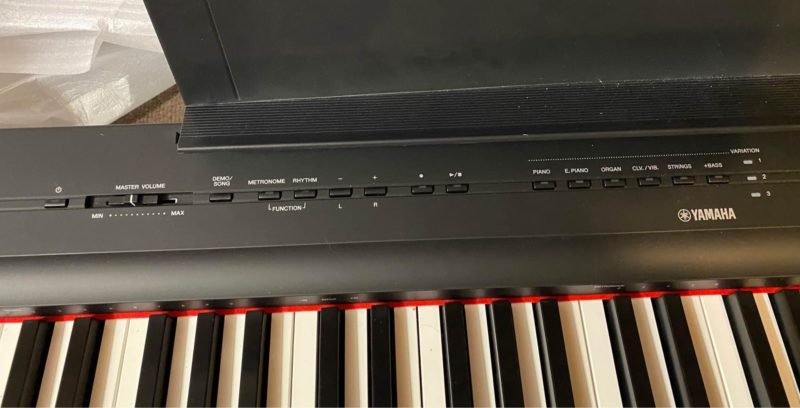
+Speaker System
This is the feature where the Alesis Recital wins over its Yamaha competitor. Beefed up with two 10W woofers and two 20W tweeters, this provides great enough amplification without the need for external speakers even when performing in a small room with an intimate audience.
Yamaha definitely outfitted the P125 with a better speaker system than its predecessor. First, it is more powerful at 7W each. Second, there are four speakers – two facing up and two facing down. These provide a more expansive stereo sound but are still objectively less potent than the Recital’s.
+Connectivity and Accessories
Yamaha’s P125 has the following in terms of connectivity: 12V DC IN, two standard headphone jacks, pedal input, AUX out of external speakers, and a USB MIDI for external devices.
The Alesis Recital almost has the same that are listed above with the P125. Unfortunately, the pedal is bought separately – quite a letdown when this is quite important. The plus point about the Recital is that it is battery-powered, making it truly portable. However, the D-batteries required are almost impossible to find so grab at least six of these when you find it.
Alesis Recital Vs Yamaha P125: The Similarities
There are a few similarities between the Alesis Recital and the Yamaha P125. I have already mentioned two above: they have the same plain plastic key texture and essentially makes use of sampling for their tone generation.
Another comparable point is their playing modes. Both digital pianos feature the Lesson Mode (splitting into two 44-key pianos of the same octave), Split Mode (bisecting into two 44-key pianos, the left playing one voice and the right playing another), and Dual Mode (layering two or more voices for a band or orchestral sound)
The two also have their own smartphone apps. Yamaha has the Smart Pianist, considered to be the best in the industry right now, and is a must-have to unlock more features and functions. Alesis partnered with Skoove so Recital users are given three months free membership to their premium program that provides lessons and other freebies helpful for beginner piano players.
Quick Rundown of the Alesis Recital
- An Electric Piano That’s Tailored to You - Feature-packed Electric keyboard with 88 premium full-sized semi weighted keys with adjustable touch response to suit your preferred playing style
- Premium Sounds - 5 voices (Acoustic Piano, Electric Piano, Organ, Synth, and Bass), built-in FX: Chorus, Reverb, and two built in 20W speakers that deliver crystal-clear, room-filling sound
- All The Right Connections - ¼” sustain pedal input (pedal not included), ¼” stereo headphone output for private practice and stereo RCA outputs for connection to speakers / amplifiers
- Play the Keyboard Wherever You Go - Power via the included power adapter or 6 D cell batteries (not included) for professional piano performance anywhere
- Powerful Educational Features - Standard, split, layer, and lesson modes with 128-note max polyphony and Skoove 3 month premium subscription for expert interactive online piano lessons
Last update on 2025-04-12 / Affiliate links / Images from Amazon Product Advertising API
Quick Rundown of the Yamaha P125
- Includes P125B digital piano, L125B furniture stand, BB1 wooden bench
- A fully weighted digital piano with 88 full sized piano style keys
- GHS weighted action is heavier in the low keys and lighter in the high keys, just like an acoustic piano
- The pure CF sound engine faithfully reproduces the tone of the acclaimed Yamaha 9' CFIIIS Concert Grand piano
- USB to host connectivity with MIDI and audio transfer means you only need 1 Cable to connect to your music making software
Last update on 2025-04-12 / Affiliate links / Images from Amazon Product Advertising API
Product Videos
Related Articles to Alesis Recital
- Alesis Recital vs Williams Legato: The Best Beginner Pianos on the Market?
- Alesis Recital vs Thomann SP-320: Which ls the Better Piano?
- SDP-2 by Gear4Music vs Alesis Recital: The Best Entry-Level Digital Pianos?
- Alesis Recital vs Roland GO Piano (P-61): Should You Invest In The Recital Pro?
- Alesis Recital Vs RockJam 88: Which $200-Digital Piano Gives More Value?
- Alesis Recital Vs Yamaha NP12: Which Of The Two Suits Your Needs?
- Alesis Recital Vs Yamaha NP32: Which Is Better For Beginners?
- Alesis Recital Vs Yamaha P45: Which Offers Great Value For Money?
- Donner DEP-10 Vs Alesis Recital: Which Is The Best Semi-Weighted Digital Piano?
- Alesis Recital vs Concert: Which Is The Better Piano For Beginners?
- Alesis Recital vs Alesis Recital Pro: Should You Invest In The Recital Pro?
- Yamaha P71 vs Alesis Recital: Why the Amazon Exclusive P71 Is the Best Option for Beginners
Related Articles to Yamaha P125
- Yamaha P150 vs P125: The Battle of the P-Series Models
- Yamaha P125 vs CLP 625: Can a Beginner’s Digital Piano Match the Clavinova?
- Yamaha P125 vs Roland FP 60: Which is the Better Investment?
- Yamaha P-121 vs P-125: Finding the Best Portable Yamaha Piano
- Yamaha P125 vs Korg LP 380: Which Piano Is Better for Your Needs?
- Yamaha P125 vs P85: Can the Outdated Digital Piano Beat the Newer One?
- Yamaha P125 vs DGX 670: Which Piano Comes Out on Top?
- Yamaha P125 vs Korg SP 280: Which is the Better Beginner’s Digital Piano?
- Yamaha P-255 vs P-125: Finding the Better Option for Beginners
- Yamaha P125 vs YDP S34 Comparison: Does the Portable P125 Hold Up Against a Console Digital Piano?
- Yamaha P125 Vs YDP 164: Should You Get A Console Or Digital Piano?
- Yamaha YDP 103 Vs P125: Should You Get a Portable or Console Digital Piano?
- Yamaha P125 Vs Kawai ES110 Comparison: Which Is The Best Portable Digital Piano
- Yamaha P125 vs Casio PX S1000: Which Digital Piano Is Worth Your Money?
- Casio PX-870 Vs Yamaha P-125: Should You Get A Portable Or Console Digital Piano?
- Yamaha P45 VS P115: Which P-Series Newbie Gives You More Value for Money?
- Alesis Recital Pro vs Yamaha P125 Comparison: Which Is The Best Portable Digital Piano?
- Alesis Prestige Artist vs Yamaha P125 Comparison: Why the Yamaha P125 Is the Better Investment
- Yamaha P125 vs Casio PX-770 Review: Why the Yamaha P125 Beats Out the Casio Console Digital Piano
- Yamaha P125 vs DGX 660 Comparison: Can the P125 Hold Its Own Against the DGX 660?
- Yamaha P125 vs Roland FP-30X Review: Why the Roland FP-30X Comes Out On Top
- Yamaha P125 vs P515 Review: Why the Yamaha P515 Is the Better Investment
- Yamaha P115 vs P125 Review: Can the P125 Beat Out Its Predecessor?
- Yamaha P125 vs Roland FP30: A Close Battle Between Two Great Digital Pianos
- Yamaha P45 vs P125: Why the Yamaha P125 Is the Better Pick for Pianists
- Yamaha P71 vs P125: Why the Yamaha P125 Is the Better Investment
Reference:
- Alesis Recital: https://www.alesis.com/products/view/recital
- Yamaha P125: https://usa.yamaha.com/products/musical_instruments/pianos/p_series/p-125/specs.html#product-tabs
Lulacruza is an electronic folk duo operating at the junction of the hypermodern and the ancient. Our music weaves together hypnotic female singing, South American folk instruments and electronic processing, while channeling pulsating waves from the source of creation.
Lalucruza is also a community where you can connect with other music lovers to collaborate, exchange ideas and share knowledge. A platform for who wants to learns the basics of playing piano, guitar, drum masters’ technique, etc.. is the premise of our website.
